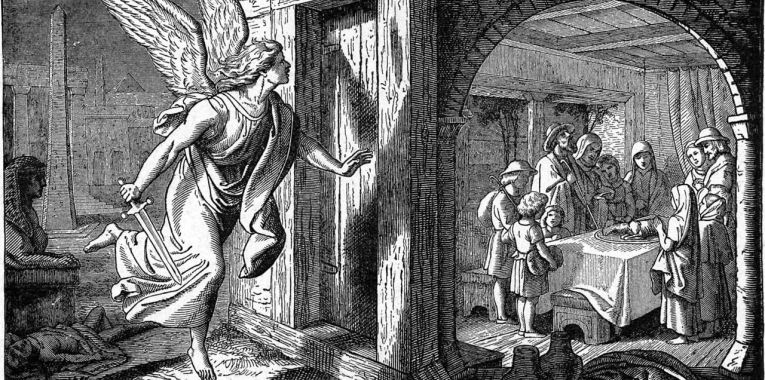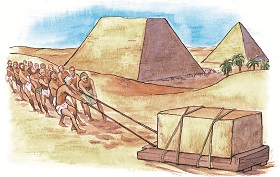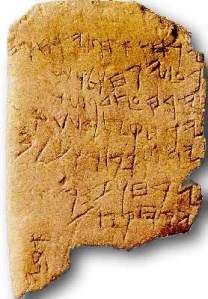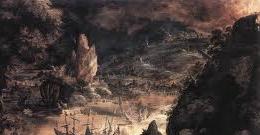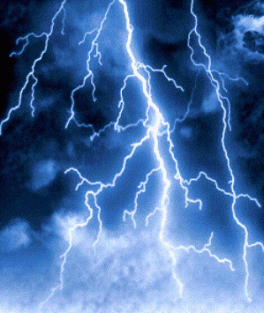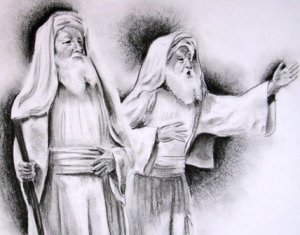The Passover meal was eaten, the Death Angel had passed, and the people were burning the remains of the carcasses, as instructed by God. How did they know when to leave?
There is much controversy over this. Why? Because many centuries ago the Jews ‘tinkered’ with the memorializing of the Passover and Feast of Unleavened Bread, shortening it and combining it.
Passover in itself is not a Holy Day…
but, for modern, Christian Passover keepers, it is a night of solemn remembrance. It looks back to the deliverance of the first Passover, and to the sacrifice of Christ. On the night he was betrayed, when He kept His last Passover he changed the symbols.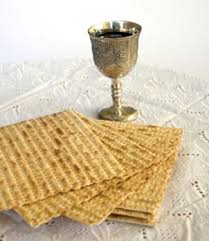 Christ kept the Passover with His disciples on the night of the 14th Nisan. But the chief priests and Pharisees kept it the following day, on the 15th Nisan. That’s why they had to rush through His illegal trial. But that is another subject altogether. 🙂
Christ kept the Passover with His disciples on the night of the 14th Nisan. But the chief priests and Pharisees kept it the following day, on the 15th Nisan. That’s why they had to rush through His illegal trial. But that is another subject altogether. 🙂
Back to the first Passover….
The people were to choose the lamb on the tenth day, and keep it till the fourteenth day…
… Then the whole assembly of the congregation of Israel shall kill it at twilight. Exodus 12: 11b
This made the killing of the lambs…
1 A family affair
2 At twilight, the start of the fourteenth day of Nisan.
About point 1 – After killing the lambs, some of the blood was to be caught and the doorposts and lintels of the Israelite homes were to be ‘painted’ with it. The people were still in their homes.
About point 2 – Exodus 12:28 Then the children of Israel went away and did so; just as the Lord had commanded Moses and Aaron, so they did.
They did ALL that Moses and Aaron relayed to them… therefore they were still in their homes. They were afraid to step out of line. They were in fear of God and terrified that this plague would happen to them. The other plagues had shown them that what God had announced, He had carried out. They were afraid to leave their houses. They were ready and waiting… but repeating the question at the start, how did they know when to leave?
If it had been as the film The Ten Commandments by Cecil B DeMille portrayed and Moses and Aaron had been sent for, gone to see Pharaoh – in defiance of God’s instructions – and been told to take their people, their flocks and their goods and leave… how did the people, in their homes, scattered all over Goshen, know it was time to leave, that the Exodus was to begin?
There were no telephones; it was well after midnight…
So is it not feasible that the signal to leave for Rameses was daylight?
Then the people could safely leave their homes and make the journey to Rameses.
So the people took their dough before it was leavened, having their kneading bowls bound up in their clothes on their shoulders. Exodus 12: 35
Rameses was in the south central part of Goshen and Rameses was the assembly area for the people. And what a gathering!
Then the children of Israel journeyed from Rameses to Succoth, about six hundred thousand men on foot, besides children. A mixed multitude went up with them also, and flocks and herds – a great deal of livestock. Exodus 12:37, 38
With that logistical nightmare, I will leave this till next week, but with the reminder that the true Passover Lamb was Jesus Christ, Son of God.
Remember, tread softly, you may be treading on someone’s dreams.






